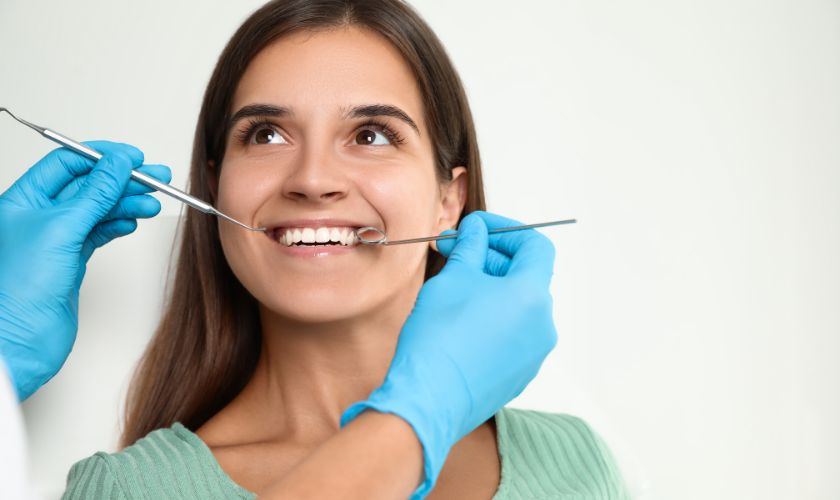Tailoring Dental Care for Elderly Patients
As we age, our dental needs become more specific and often more complex. Understanding these needs is crucial for maintaining not just oral health but overall well-being. Here’s a closer look at how dental care is being adapted to better serve elderly patients.
Anúncios
The Importance of Regular Check-Ups for Elderly Patients
It’s a common misconception that losing teeth is an inevitable part of aging. Regular dental check-ups can prevent many issues before they become serious. Dentists can spot signs of tooth decay, gum disease, and even early indications of more serious health problems like diabetes or heart disease. For elderly patients, these check-ups are not just advisable; they are essential.
Anúncios
Adapting Dental Treatments for Ageing Teeth
The teeth of elderly patients are more susceptible to decay and other problems due to a lifetime of wear and tear. Many elderly individuals also suffer from dry mouth – a side effect of many medications which reduces saliva flow and increases the risk of tooth decay. Dentists now use more fluoride treatments and special moisturising mouthwashes to combat this.
Elderly Patients: Challenges with Dentures and Implants
Many elderly patients use dentures or have dental implants. Both require specific care routines. Dentists are now providing more personalised guidance to ensure these dental solutions last longer and provide maximum comfort. This includes advice on cleaning techniques, the use of appropriate adhesives for dentures, and monitoring for any adjustments needed over time.
Anúncios
Managing Dental Anxiety
Dental anxiety can increase with age due to mobility issues or past traumatic experiences at the dentist. Today, dental practices are more sensitive to these concerns, often offering longer appointment times and sedation options for those who need them. This approach helps to reduce stress and make dental visits more manageable for elderly patients.
The Role of Diet in Dental Health
What we eat plays a huge part in our dental health, and this is especially true for the elderly. Dental professionals are now working closely with dietitians to provide dietary advice that supports strong teeth and gums. This might include recommending nutrient-rich foods that are easy to chew and digest, helping to maintain dental health as well as overall physical health.
Emphasising Communication and Education
Effective communication is vital when it comes to dental care for the elderly. As patients age, they may face challenges such as hearing loss or cognitive impairment, which can complicate discussions about dental health. Dentists are increasingly focusing on clear, simple explanations and using visual aids to ensure that their elderly patients fully understand their treatment options and the importance of ongoing dental care. This also involves training for dental staff to enhance their communication skills specifically tailored to interact with older adults.
Leveraging Technology for Better Care
Technology is playing a crucial role in advancing dental care for the elderly. From digital x-rays that reduce exposure to radiation to advanced imaging techniques that provide clearer, more detailed views of dental structures, technology is making dental care safer and more effective for elderly patients. Additionally, software advancements allow for better tracking of a patient’s dental history, ensuring that care is continuous and comprehensive.
Elderly Patients: Accessibility and Comfort in the Dental Office
Accessibility is another key aspect of improving dental care for the elderly. Many dental offices are now designed to be more accessible for those with mobility issues, including ramps, wider doorways, and special dental chairs. Comfort is also a priority, with many practices offering neck cushions, blankets, and even entertainment options to help patients relax during their visit.
The Role of Caregivers in Dental Health
Caregivers play a crucial role in maintaining the dental health of elderly patients. Dentists are increasingly collaborating with caregivers to educate them on daily dental care routines that are crucial for elderly individuals, especially those who may have difficulty performing such tasks themselves. This includes training on how to assist with brushing and flossing effectively and recognizing signs of dental problems that need professional attention.
Elderly Patients: Forward-Looking Strategies for Ageing Smiles
Looking ahead, the focus on geriatric dental care is set to increase as the population ages. Dentists are advocating for more research into the specific dental needs of elderly patients and the best practices for addressing them. There is also a growing emphasis on preventive care and early intervention, which can significantly reduce the need for more complex treatments later on.
Dental care for the elderly is all about adaptation and sensitive management. By focusing on preventive care, customising treatments, and supporting the unique needs of elderly patients, dental professionals are helping to improve the quality of life for many. It’s not just about treating teeth but supporting a healthier, happier ageing process.




